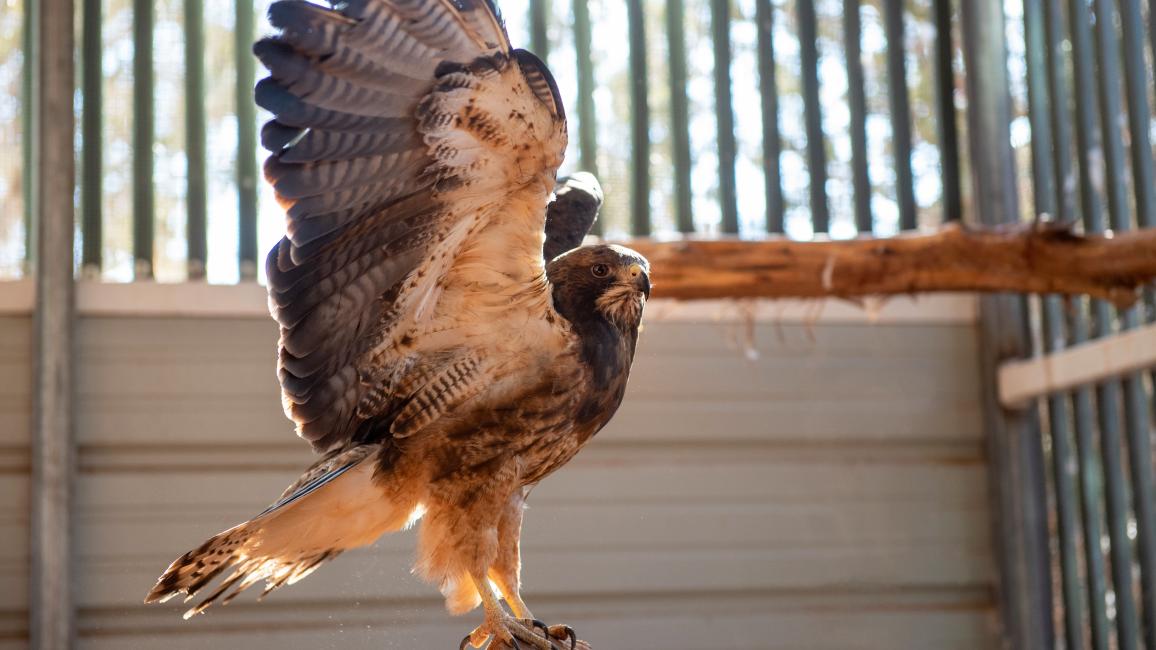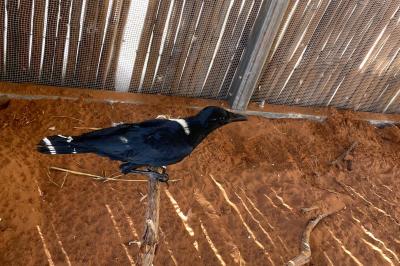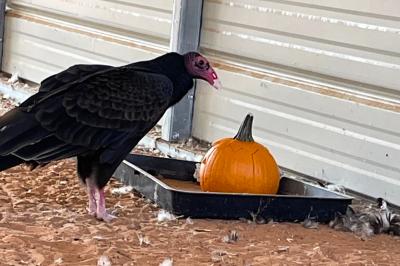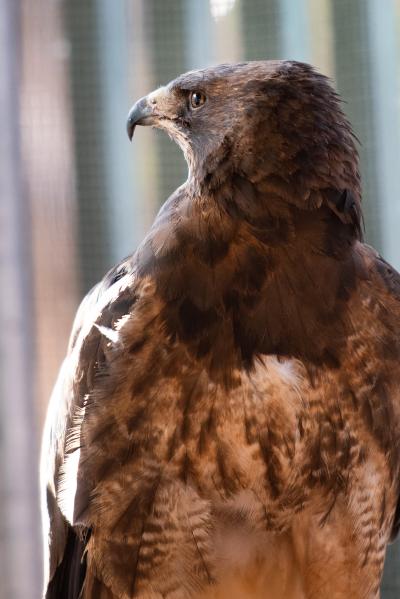Meet the feathery new educators at Wild Friends

From orphaned baby hummingbirds to injured owls, when a new animal arrives at Wild Friends — Best Friends’ state and federally licensed wildlife rehabilitation and education center — the goal is to get them healthy and ready to return to the wide-open world.
There’s nothing quite like watching an eagle who’d been grounded for months, or a flock of ducks who’d lost their mother, take off back into the wild without a single glance behind them.
But sometimes release isn’t an option. An injury may make a bird unable to fly, perch, or hunt, and they wouldn’t be able to survive in the wild. Sometimes, a well-meaning person tries to take in a wild baby animal to raise as a pet or rehabilitate themselves without the proper education, and the animal imprints on them and doesn’t learn important survival skills. Of course, even if they can’t return to the wild, they need a place to live as comfortably and happily as possible. So what then?
Well, then those animals become ambassadors for their species, as well as all other wildlife who might find themselves in a tough situation. It’s a pretty good deal, all things considered. They are moved into spacious enclosures with plenty of enrichment, perches, and hidey-holes — plus they get all their meals delivered. Then, volunteers and visitors to Wild Friends can learn from staff all about these educational ambassadors and what to do if they find an injured or orphaned animal. (The answer is always: Call your local wildlife rehabilitation center.)
Wild Friends recently welcomed three new ambassadors to the team: Mr. Jones the crow, Honey the turkey vulture, and Winnick the Swainson’s hawk. Here are their stories.
Counting crows with Mr. Jones

For several years, Wild Friends hosted a pair of non-releasable crows, Ebony and Annabelle. Ebony had a wing injury that left her unable to fly. And Annabelle, whose feet twisted underneath her, had been raised by people. But when Annabelle, sadly, passed away at almost 23 years old, shy Ebony was suddenly by herself.
“With birds as smart as crows and ravens, we do not like to leave them alone, especially because Ebony is not one of our more outgoing ambassador animals,” explains Corinne Blossfeld, Wild Friends’ licensed wildlife rehabilitator. So the team started searching for a friend for their lonely crow, and when Corinne reached out to another wildlife rehabilitation center, she found Mr. Jones.
He had just been brought in that week in a surprisingly similar state to how Annabelle was. He was familiar and friendly with the people around him, and his legs, likely from poor diet in captivity, had not grown properly.
Because Mr. Jones would not be able to return to the wild, and both he and Ebony needed a crow friend, he came to live at the Sanctuary. After he was treated for an intestinal infection, the introduction to his new flockmate went swimmingly (or should we say flyingly?). And though they started in a divided aviary to get used to one another, soon the pair are due for an upgrade to a new enclosure where they can hop around and play together with nothing in the way.
With a new, healthy diet and specialized perches, Mr. Jones is happy to be the one in the spotlight when tours come by as Ebony watches from the back of their aviary. His story teaches visitors the importance of taking wild animals to rehabilitation centers and not trying to care for them at home.
Sweet as Honey

Sometimes, when a bird of prey or scavenger has the chance, they eat a bit too much, and it weighs them down so that they can’t fly away from dangers as quickly or as easily as they’re used to. Often, the danger comes in the form of cars when they’re eating on the side of the road. But in the case of Honey the turkey vulture, it seems to have been another animal like a coyote. She was found unable to fly, already missing part of her wing, and was brought straight to Wild Friends.
While veterinarians were able to clean up Honey’s injury, the team knew that with the injury she had, she would not be able to survive in the wild. For a bird who should be able to ride the wind currents for miles without flapping, Honey could only flap a short distance from perch to perch. She would, instead, be staying to teach people about vultures — so often misrepresented in the media as something spooky to be feared.
“Turkey vultures are so incredibly smart and beneficial to the environment,” says Corinne. “We are excited to share her story and all the other vultures’ stories.”
The work to get Honey prepared for her new role as ambassador started almost immediately. “While she was in recovery, we would just sit in there and talk to her, put her food out and wait for her to come and eat it while we were still in there,” says Lauren Ross, caregiver and licensed rehabilitation sub-permittee. “Now we’ve got her to the point where she comes right up to us.”
The wonderful Winnick

Winnick the Swainson’s hawk (or Winni to her friends) was thin and dehydrated when she was found and brought into the same rehabilitation center Mr. Jones came from, her wing injured from what seemed to be an electrocution. She needed surgery to fully amputate the part of her wing that couldn’t be saved, which meant she wouldn’t be able to fly the long distances required to migrate with the rest of her species to Argentina in the fall.
Instead, she landed at the Sanctuary, where her “spicy” personality immediately charmed anyone around her. In the hopes of glove-training her to better show off and talk about her story, the rehab team quickly began working to earn her trust.
“We just started being in with her every day and making sure she was eating next to us,” Lauren says. “And then we moved closer and closer, and then we were handing her the food. That’s a huge level of trust that she’s shown us for being a wild adult bird when she came in. I really like her; she’s got a lot of personality.”
While these birds can’t return to the wild, the rehab team is doing everything to make sure they are healthy, happy, and never bored in their new home. And their new jobs as wildlife ambassadors are important. So remember, if you find injured or orphaned wildlife, do what Mr. Jones, Honey, and Winni would want you to do: Contact your local wildlife rehabilitation center, so they can have the best chance at a good future.
Support our wild friends
You can join Best Friends in caring for many species of animals (including wildlife like Mr. Jones, Honey and Winnick) by becoming a member.